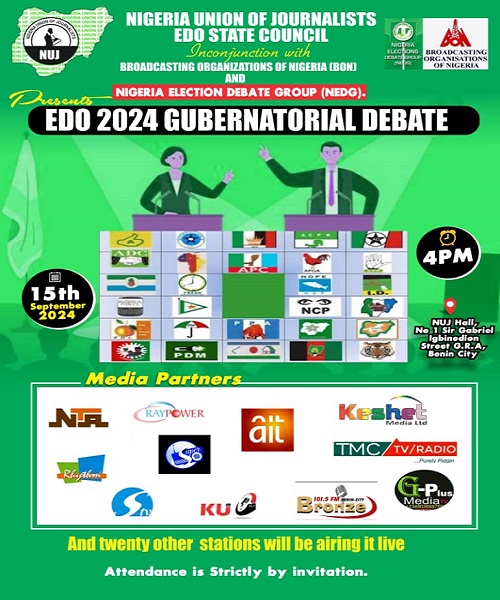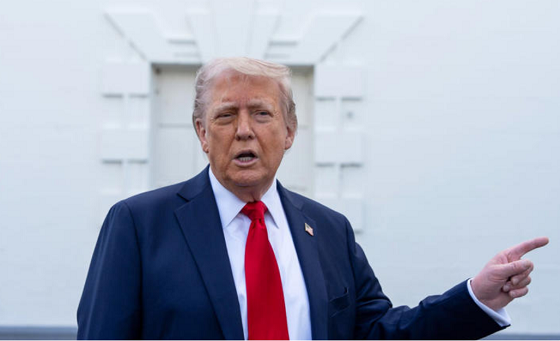Post Published on August 23, 2024 by Anthony Ekata
One may ask, “How do we know that Senator Okpebholo will allow the people currently speaking for him to manipulate him for their personal benefit if elected?” It is simply because he said so himself in the public space. He pledged at the APC State Secretariat Benin City on Tuesday 30th January 2024, when he declared his gubernatorial aspiration to party leaders that, as governor, he would ensure that his party leaders and kingmakers no longer cry in silence for being abandoned by those who helped them to power. His words:
“Whenever I talk to myself, I said, I find myself in the circle of leadership. People are thinking it’s just Chief Anenih alone I was close to. No! I was close to Solomon Lar. I grow up in Jos. I was close to him. I saw how leaders suffer after putting somebody in an office, just like what you are suffering here. You are suffering it in the hands of Obaseki. Things will not repeat itself in my time [Applause] because it is something I see leaders; by the time them go inside their bedroom, they start crying, “We have suffered, we have worked, we have done everything to make sure this person is there, and he has forgotten us. If I forgot … If I forget any leader, God will not forgive me.”
Watch him say this and more in this section.
The Edo 2024 Gubernatorial Election and the Debate Imperative: Part 2
Welcome to the concluding part of the essay. In this section, we complete the throwback in Part 1 on the 2015 NEDG-organised presidential election debate which General Muhammadu Buhari shunned, and reflect on the need for debates in a modern democracy, with particular focus on what is currently playing out in Edo State.
Please read on!
What specific plans, programmes and strategies would you employ to rehabilitate victims of insurgency in the Northeast, reconstruct the zone and effectively check insecurity?
PDP
The PDP government, Goodluck Jonathan said, was already recovering territories from the insurgents and using a four-prong strategy to rehabilitate the victims and reconstruct the devastated zone. These are the National Emergency Agency (NEMA), the Victims Support Fund (managed by the Private Sector) the Presidential Initiative (PINE) and the Safe Schools Initiative. He said these were all part of a total package while the government was also strengthening the capacity of the security agencies by adopting new strategies like the use of drones.
UDP
The United Democratic Party’s Godson Mgbodile Okoye contended that with less than 300,000 men in the Army, Navy and Air Force, and insufficient police hands, the government had the wrong security architecture in place. Okorie said there must be more recruitment, removal of army formations from the city centres, and provision of social welfare (health, education, etc) for displaced persons.
UPP
Chekwas Okorie proffered the decentralisation of the police and security agencies. He said his government would use state police and community policing to get everyone to be a stakeholder in the security of the country so that problems are nipped in the bud. It would also ensure a functional, well-trained, and better-motivated military.
KOWA
KOWA’s Oluremi Sonaiya said no success in the fight against terror would be meaningful without bringing back the abducted Chibok girls. On strategy and programmes, she said:
- There must be insurance for the troops
- Trust is important for people to be able to give information without a backlash
- KOWA would set up a Marshall Plan to rebuild the North East
NCP
The National Conscience Party’s candidate, Martin Onovo waxed philosophical, postulating that everyone does not have the same moral threshold; therefore, if the leadership is weak and unpatriotic, the people would tow the same line. He said high unemployment, corruption and impunity would continue to provoke people to react in negative ways and so there must be the right values as a people.
What are your immediate and long-term plans to restore dignity in the education sector?
UPP
Chekwas Okorie of the UPP said education should not be the responsibility of the federal government. While commending government efforts to improve access by establishing special schools like the Almajiri schools, Okorie said the standard of education began to fall when it started being run by the government based on quota considerations to allow some disadvantaged parts of the country to catch up with others. A UPP government would therefore privatise and make education competitive, equip teachers sufficiently to be able to deliver, and review their remuneration.
KOWA
Oluremi Sonaiya, who described ignorance as one of the evils bedevilling Nigerian society, said KOWA would address the problem of falling standard of education in two dimensions: formal and informal. She explained that a KOWA government would make education to lead to transformation, find solutions to societal problems, and teach values of rights and responsibilities, good conduct and morality. To do this, the curriculum would first have to be reviewed to gear it towards problem-solving.
NCP
Martin Onovo of the NCP described the problem as multi-dimensional, spanning a lack of infrastructure, qualified manpower, and basic tools. He said the government would focus on federal schools to ensure that they met prescribed federal standards, do gap analyses and evolve gap closure plans. According to him, corrupt practices in the recruitment of teachers and the diversion of funds meant for the education sector were also contributing to the problem. The issues of leadership and bad governance would therefore need to be addressed.
PDP
Goodluck Jonathan pointed out that education was on the concurrent list. He held that the federal government was not running the education sector solely but complementing other tiers of government by building and equipping schools. Consequently, most universities, polytechnics and colleges of education were being equipped with Tertiary Education (Special) Funds (TETFUNDS) that would be consolidated going forward. The PDP presidential candidate asserted that Nigerian universities were climbing back into reckoning and cited open-heart surgeries and trail-blazing stem cell transplants being carried out at some Nigerian universities.
UDP
For the UDP candidate, Godson Okoye, the education sector must be re-engineered from the basic levels up – nursery, primary, secondary, etc. Okoye said set standards must be met and the government would take teacher training colleges very seriously. There must be teacher training colleges in every state of the federation and even local government areas, he stressed, and the government should intervene in universities to provide the necessary infrastructure.
What specific plans are lined up to address agriculture with a view to making it more productive?
KOWA
KOWA Party, Oluremi Sonaiya declared, would give priority to grains production, provide high-yielding grains, facilitate selective mechanisation and strengthen cooperatives to multiply farmers’ yield. She pledged that a KOWA government would further empower commodity boards, develop export crops and use agriculture for employment generation and women empowerment.
NCP
Martin Onovo outlined the NCP’s strategy thus:
- Supply adequate fertilisers.
- Support farmers and encourage the unemployed to farm
- Facilitate access to farmland
- Facilitate mechanised agriculture
- Increase access to credit facilities
- Reintroduce agriculture extension services to provide technical support
PDP
The PDP candidate, Goodluck Jonathan, maintained that the ruling party had already adopted a template that had resulted in a giant reduction in the importation of food. According to him, that was why food prices had remained stable despite the unexpected drop in oil prices. The Food and Agriculture Organisation (FAO)’s award to Nigeria for the reduction of hunger by 50%, he asserted, attested to that fact. He reminded the audience that the federal government was taking agriculture as a business with emphasis on value addition and total value chain. He said the government was also encouraging dry season farming, multiple cropping, providing high-yielding varieties, e.g. cocoa, and improving access to farm input.
UDP
Mechanisation, reform of the Land Use Act and increased access to farmland would be part of the UDP’s strategy. Godson Okoye said the government would set up cooperatives to buy up farm produce to shield the farmers from the vagaries of the commodity markets, establish agric banks dedicated strictly to agriculture and provide high-yield export crops for cultivation in the country’s abundant arable land.
UPP
A structural approach would be adopted by the UPP, according to Chekwas Okorie, the party leader. It would expunge the Land Use Act so that landowners can use their titles to secure agricultural capital, modify the grazing policy and restructure the nation on a geo-political basis to make for true federalism.
One thing is clear from the foregoing: All the candidates displayed considerable understanding of the challenges and proffered appreciable strategies to combat them. Their responses provided a compass and a framework with which to monitor and evaluate them if they won the election. Some readers of this piece might wonder if the nation would have fared better between 2015 and 2023 under any of these candidates. However, the big question is, how did their ‘grammar’ at the debate help their chances at the election? This is a very relevant question to ask considering that Muhammadu Buhari, who did not attend the debate, won the election. The answer should be obvious in what happened during Buhari’s 8-year tenure. We shall come to this later.
The PDP candidate in the Edo gubernatorial election, Dr Asue Ighodalo, has a manifesto tagged ‘A Pathway to Prosperity’. He has been expounding, locally and internationally, his ‘Marshall Plan’ to launch Edo State into what he calls a first-world economy. Besides the regular physical campaigns, he has attended several Town Hall meetings and media interviews at home and abroad to answer questions on his manifesto, using the language understood by the greatest number of people – the regular English and Pidgin English. He uses dedicated social media platforms, including his personal Twitter (X) account to disseminate his messages. It is common practice these days for politicians to engage with their constituents through this medium.
This cannot be said for Senator Monday Okpebholo who seems naturally media-shy. The Town Hall meeting he attended in the United States yielded more controversy than assurance about his fitness for the number one job in Edo State. A cursory look at both candidates’ Twitter (X) personal pages shows that Asue, with almost ten thousand followers, joined the platform in April 2014, while Akpakomiza joined ten years later – in March 2024 – apparently after he was confirmed as the APC candidate, and has managed to garner 519 followers at the time of this publication.
Senator Okpebholo’s personal qualities are not in doubt. His vision for Edo State, according to Martins Itua, “is one that is rooted in sustainable development, economic empowerment, and social justice. His focus on creating jobs, improving education, and fostering a more inclusive society reflects a forward-thinking approach that prioritizes the long-term well-being of the state over short-term political gains. He understands that the challenges facing Edo State require practical solutions, not just lofty promises.” This is a fantastic vision. The call is for him to use a formal medium, like his counterparts, to tell Edo people at home and abroad, himself, how he intends to implement this vision, even if he has to convey that in Pidgin English. Without this, there is justifiable apprehension that those currently speaking for him would be the ones telling him what to do, if elected. This is more worrisome as some of these people have a promise-and-fail track record and are known to put their ambitions and personal interests above the interests of the common man.
Unquestionably, the face of Senator Okpebholo’s campaign is former Edo State governor and former APC National Chairman, Senator Adams Oshiomhole. He seizes every opportunity to tout the candidate’s humanitarian interventions in Esan Central Senatorial District. His critics are asking how many boreholes Adams Oshiomhole sank for his own people before he was elected Edo State Governor in 2007. How many schools did he build or renovate? How many roads did he construct or reconstruct? How many electricity transformers did he buy for them to show his empathy? If philanthropy and empathy were electability parameters, would the landlord of Osadebey House for 8 years be a man who told a hapless widow, struggling to eke a living for herself and orphaned children by hawking on the streets of Benin City, to “go and die”?
One may ask, “How do we know that Senator Okpebholo will allow the people currently speaking for him to manipulate him for their personal benefit, if elected? It is simply because he said so himself in the public space. He swore at the APC State Secretariat Benin City on Tuesday 30th January 2024, when he declared his gubernatorial aspiration to party leaders, that as governor, he would ensure that his party leaders and kingmakers no longer cry in silence for being abandoned by those who helped them to power. His words:
“Whenever I talk to myself, I said, I find myself in the circle of leadership. People are thinking it’s just Chief Anenih alone I was close to. No! I was close to Solomon Lar. I grow up in Jos. I was close to him. I saw how leaders suffer after putting somebody in an office, just like what you are suffering here. You are suffering it in the hands of Obaseki. Things will not repeat itself in my time [Applause] because it is something I see leaders; by the time they go inside their bedroom, they start crying, “We have suffered, we have worked, we have done everything to make sure this person is there, and he has forgotten us. If I forgot … If I forget any leader, God will not forgive me.”
Watch the video HERE and please leave your comments, share and subscribe to our channel.
There is also the matter of ethnic bigotry unwittingly infused into Senator Okpebholo’s profile by his campaigners. I have argued on several platforms that those pushing the ‘homeboy’ narrative and benchmarking his suitability for office with his competence in his native Esan language are not doing him any favours. Will Esan be adopted as the language for official business and instruction in Edo schools if Okpebholo becomes governor? Esan people constitute only about 13 percent of the Edo State electorate. The impression this narrative conveys to the rest of Edo State citizens is that Esan people would hijack the state’s political and socioeconomic structures if Akpakomiza is elected governor, in much the same way President Buhari Fulanised the Federal Government during his tenure. Akpakomiza aggravated this apprehension when he declared publicly that if he were the Chairman of a bank, like Ighodalo, he would flood the bank with his (Esan) people and nothing would happen. He told his bemused audience:
“How many Esan is in that [Sterling] bank? As the Chairman of the bank, you own the bank. At the time you are the Chairman, you do anything you want to do. If I’m there, I will flood the place with Esan people, and nothing will happen!”
You can also watch the video HERE
The declaration was applauded by members of his audience with one of them saying, quite loudly, in Esan language, “We know what you are capable of doing!” Okpebholo’s declaration, which betrays ignorance of the principles of corporate governance, is not far from what the semi-literate Governor Barkin Zuwo said in 1983 when over 3 million naira cash was found in his Kano Government House bedroom. “There is nothing wrong with keeping government money in Government House,” Zuwo told his traducers. For this, he was sentenced to 300 years in prison in 1985 by a Special Military Tribunal under the despotic regime of Major General Muhammadu Buhari.
Okpebholo’s suspected tribal bigotry is one issue Edo people would certainly demand an explanation for in a debate or formal public engagement setting. Rufai Oseni of Arise Television has confirmed that he invited the APC candidate via his (Oseni’s) Twitter page for an interview with the station’s Morning Show crew like his PDP and Labour Party counterparts. According to Oseni, the candidate’s APC handlers demanded a million-dollar appearance fee. Even as a joke, that is a joke taken too far. It is symptomatic of total disregard for the wishes of the Edo people, no matter the number of people demanding that appearance. It forebodes a scenario akin to Buhari’s insulation from the public, despite demands for him to address the people on the state of the nation at critical moments.
One of Senator Okpebholo’s staunchest critics is John Mayaki, a media veteran and former Chief Press Secretary to Governor Godwin Obaseki. He previously served as the Chairman of the Edo State Media and Publicity Directorate in the APC Presidential Campaign Council. Mayaki, who serially refers to Okpebholo as the “mute candidate” says, “Osadebey Avenue [the seat of power] is a place for serious-minded individuals capable of designing and implementing policies that will expand the economy, create jobs, and improve the living standards of the people. It is for men like Asue Ighodalo, who have committed themselves to study, can articulate a vision, and are able to entrust important state responsibilities to competent hands – not surrogates sent by the whispering godfathers at midnight.”
The impression that Senator Okpebholo is intellectually challenged is deeply entrenched, especially in the media. An exasperated Charles Aniagolu, a veteran broadcaster at Arise Television, told Prince Kassim Afegbua, the official spokesman for Senator Okpebholo’s Campaign, to his face, “I have to be honest, I mean, listening to him, he doesn’t sound articulate or even vaguely literate. And I’m not trying to be rude; I’m just being honest. That’s how he comes across to me” Yet, another Arise TV show host, a Newsday anchor said of him, “Monday Okpebholo or the other person are just comedians. You know, they are just playing a script which will not take them anywhere.”
See these for yourself HERE and HERE.
Some Okpebholo supporters believe there is a gang-up by Arise TV against their candidate. It is imperative for the candidate to demonstrate that these damaging impressions are fallacious by using any conventional media platform(s) of his choice or appearing at scheduled debates and Town Hall meetings to debunk them himself. He does not have to do that like Cicero or in King’s English.
Bashorun MKO Abiola (God bless his soul), the [undeclared] winner of the aborted 1992 presidential election, was a philanthropist per excellence. His unparalleled humanitarian interventions had no geopolitical boundaries. He was not the most eloquent speaker of all the candidates in that election. Indeed, he was a stammerer, but that did not stop him from mass media engagements where he outlined his vision and strategies to take Nigeria to the next level. If only regressive forces had given Nigerians the opportunity to see for themselves how far he could walk his talk!
Whereas the voting decisions of die-hard supporters on both divides may not be swayed by the candidate’s peccadilloes, insights from debates allow independent voters to take calculated risks with their ballots, and the rest of the people to prepare themselves for what they are likely to get for their voting decisions or for not voting at all. As the popular saying goes, not voting for the right person is a vote for the wrong person.
Muhammadu Buhari’s absence at the 2015 NEDG debate left the nation in the dark as to his readiness and capacity for the onerous presidential responsibility, aside from choreographed messages on campaign podiums, most of which were dominated by praise-singing and mudslinging. Also, millions of Nigerians and members of the international community believe till date that Buhari did not win that election fair and square. Any wonder that he led Nigerians to the middle of nowhere? Is that a risk Edo people want to take?
One person who believes that a sound education and superlative debate performance can enhance the chances of candidates at elections is Professor Bolaji Akinyemi. Speaking on the chances of Kamala Harris against Donald Trump, he said:
“Kamala Harris is going to be a hard nut for Trump to crack. Be careful of lawyers, especially someone who has been an attorney general and a prosecutor. She will take you to pieces with the way she will put her own questions and the way she will use you to wipe the floor. She won the Senate seat by 60% from California when she ran, so you see that she is not an easy nut to crack.”
As a professor of political science and former minister of foreign affairs, Akinyemi should know.
Watch him HERE.
The Nigeria Union of Journalists (NUJ) Edo State Council, in conjunction with the Broadcasting Organisations of Nigeria (BON) and the Nigerian Elections Debate Group (NEDG) has scheduled a multi-party debate among the gubernatorial candidates for Sunday, 15th September 2024 at the ultra-modern NUJ Secretariat in the state capital. Council Chairman, Comrade Festus Alenkhe, confirmed in a chat the readiness of the organisers for the event.
See the debate promo HERE and share.
Will all the candidates attend?
Should they?
Please, leave your comments in the Reply section below and share.







